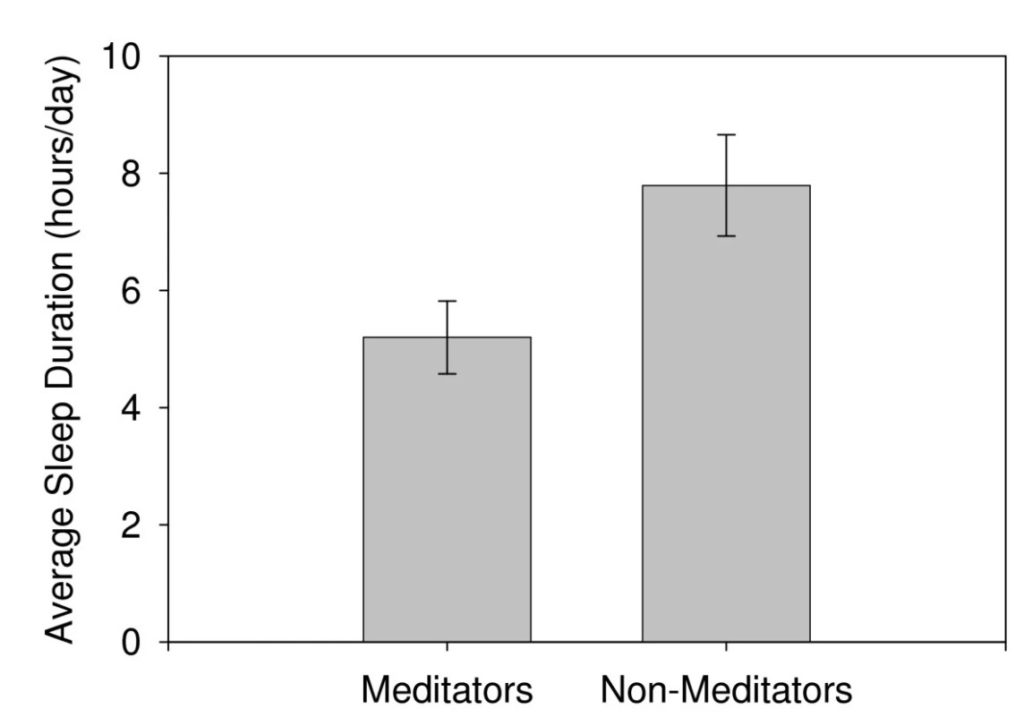Sleep and meditation are different processes, and are not interchangeable. However, studies have shown that experienced meditators do tend to sleep less, and also that meditation can help reduce exhaustion and daytime drowsiness.
When it comes to meditation and sleep, there’s much more anecdotal experience than there is scientific evidence.
These 100 meditation scripts were created to help beginner and intermediate meditators practice key mindfulness concepts like self-love, forgiveness, gratitude, and inner peace.
Designed to fit into busy schedules, each meditation script lasts 3-5 minutes. Perfect for starting or closing a group meditation; for yoga, coaching, or therapy sessions; or for your personal meditation practice.
Some meditators report needing less sleep than they used to. And according to some ancient Buddhist texts, four hours of sleep a night is enough for experienced meditators.
The research in this field is limited. What we know is that sleep and meditation are different processes, and are not interchangeable. Meditation cannot replace sleep, but studies have shown that experienced meditators do tend to sleep less, and also that meditation can help reduce exhaustion and daytime drowsiness.
Let’s explore common questions about sleep and meditation, and review what the latest research says.
Does meditation replace sleep?
Meditation cannot replace sleep, as each is a different process.
Dr. Herbert Benson of Harvard University found that “Meditation evokes some of the physiologic changes that are found in sleep, but the two are not in any way interchangeable, nor is one a substitute for the other.”
However, recent research has produced data showing that experienced meditators sleep significantly fewer hours than non-meditators, and that meditation can improve performance even for novice meditators.
In addition, meditation has been shown to promote higher-quality sleep and reduce insomnia.
Where does the idea that meditation replaces sleep come from?

Meditation has been around for thousands of years, so anecdotes are plentiful.
A commonly held belief is that meditation can replace sleep or reduce the need for sleep, especially as meditators become more advanced.
Some yogis in India promote extreme versions of this belief (Sri Sri Ravi Shankar: “20 minutes of meditation can equal eight hours of good sleep.”)
It’s not just yogis and ancient traditions, though.
Needing less sleep is a fairly commonly reported phenomenon among intermediate and advanced meditators. However, this information is largely anecdotal.
Studies show an association between experienced meditators and less sleep, but the research in this area is not robust.
Meditation and less sleep (here’s what the research says)
Although a few scientific studies have investigated this idea, there is not much research in this area yet.
The fullest study so far was done in 2010 by researchers at the University of Kentucky. The average sleep duration of a group of experienced meditators in Delhi, India was compared against non-meditators.
Experienced meditators slept 5.2 hours per day, as compared with non-meditators, who slept 7.8 hours per day.

The researchers found an association between experienced meditators and less sleep, but weren’t able to determine why: “It is also possible that meditation might be able to do whatever it is that sleep does, by a different but overlapping process.”
They concluded:
“Multiple hours spent in meditation are associated with a significant decrease in total sleep time when compared with age and sex matched controls who did not meditate. Whether meditation can actually replace a portion of sleep or pay-off sleep debt is under further investigation.”
Can meditation make up for a lack of sleep?

Meditation may be able to compensate for exhaustion and sleep debt, according to two studies.
A 2018 study at Oregon State University found that mindfulness exercises can help improve feelings of exhaustion among entrepreneurs with sleep debt.
The study’s lead author said:
“You can’t replace sleep with mindfulness exercises, but they might help compensate and provide a degree of relief. As little as 70 minutes a week, or 10 minutes a day, of mindfulness practice may have the same benefits as an extra 44 minutes of sleep a night.”
The 2010 University of Kentucky study referenced above also found reason to believe that meditation could help counteract daytime sleepiness and improve performance, possibly as an preferable alternative to naps:
“In either case, if meditation is restorative in a manner similar to sleep, it might benefit individuals with excessive daytime sleepiness due to sleep disorders or to lifestyle factors. Not only might these meditation bouts reduce accumulating sleep debt, but individuals may also benefit from the short-term performance improvements noted above, without the problems of sleep inertia that occur with longer naps.”
Is meditation a form of sleep?
No, meditation is not a form of sleep.
Meditation induces some of the physiologic changes found in sleep, but it’s a different process.
According to Dr. Herbert Benson of Harvard:
“Are the physiologic changes associated with meditation the same as those found in sleep, another hypometabolic state? There is little resemblance… Meditation is therefore not a form of sleep; nor can it be used as a substitute for sleep. Meditation evokes some of the physiologic changes that are found in sleep, but the two are not in a any way interchangeable, nor is one a substitute for the other.”
Can meditation improve sleep?

Yes, meditation has been shown to improve sleep.
Studies have shown that meditation enhances melatonin levels in the body.
Melatonin is a precursor to sleep. Meditation also lowers levels of cortisol, the stress hormone, and slows the heart rate.
Experienced meditators have been shown to experience improvements in slow-wave sleep and REM sleep, and fewer nighttime awakenings.
Balancing sleep and meditation
Whenever possible, get a full night’s sleep. Meditation is not a substitute for sleep.
However, meditation can help you feel more rested, and can be a better alternative than a nap to improve daytime drowsiness, since it doesn’t come with the side effects of sleep inertia.
If you’re struggling to find time in your day to meditate, getting up earlier and replacing a short amount of sleep with meditation may be a good option for you, since meditation can help you feel more rested and increase clarity and wakefulness.
Frequently asked questions
Is meditation a form of rest?
Yes. Meditation can produce a deep state of relaxation and tranquility. A 2018 study by Oregon State University also found that meditation was effective in reducing exhaustion and daytime drowsiness, and may serve as a substitute for a nap.
Do you need less sleep when you meditate?
Anecdotally, some experienced meditators find that they sleep less, and in a 2010 study on sleep and meditation, the non-meditators slept 7.8 hours a night while the meditators slept 5.2 hours a night.
However, there is no research beyond this association to suggest that meditation can replace sleep, or that you should sleep less if you meditate.

My mindfulness practice kicked off in 2016 with a ten-day silent retreat. Since then, I’ve read dozens of books about mindfulness and completed hundreds of hours of meditation. Thinking about what makes humans happy, calm, and peaceful is endlessly fascinating to me.


